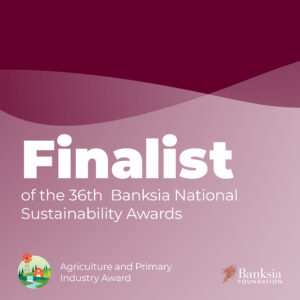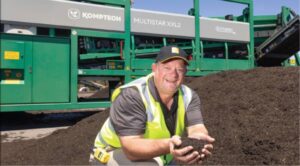Gyprock pile at C-Wise prior to recycling
The Fiona Stanley Hospital is the biggest building infrastructure project ever undertaken by the State Government. At a construction cost of $2 billion the hospital will make a massive contribution to health services in WA. Quantities of materials required for construction are enormous for example100,000 cubic metres of concrete, 1000 kilometres of power and lighting cable and 425,000 square metres of plasterboard (gypsum).
Managing Contractor for the project, Brookfield Multiplex set an ambitious goal to minimise waste going to landfill of 75%. This meant recycling 75% of all building and construction wastes.
One major waste stream was the plasterboard off cuts. Constructed from gypsum, this material can be recovered for use in growing plants as part of a soil improvement product.
C-Wise a locally based organic soil fertility company C-Wise operating east of Mandurah took the waste plasterboard and treated it to break down the particle sizes of the material, before adding to their compost production cycle for decomposition.
Gypsum is a useful soil additive where it helps to make clay soils easier to dig and drain. For this reason it well known in Eastern seaboard gardens where heavy soils make gardening difficult. It is composed mainly of calcium sulphate and both of these elements have valuable horticultural effects and nutrients even for Perth’s sandy soils.
Once the board has been soaked in a slurry to soften and then physically broken up into tiny pieces, it is difficult to see in the final product. When fully composted the resulting organic mixture is screened to produce mulch and soil improver for use in horticulture, home gardens and commercial planting.
Brookfield Multiplex put in a lot of effort to make the recycling of plasterboard successful. This included an education program for the large workforce on the Fiona Stanley site and the provision of special bins for collecting just this one form of waste. As with all recycling projects, contamination of the waste stream is major limiting factor. An ongoing program of monitoring and reporting back to subcontractors resulted in a dramatic reduction in contamination and meant the recycle effort could proceed.
Total construction waste since July 2010 amounts to 54,000 tonnes of which 96.5 % was recycled and as such, avoided going to landfill. This easily exceeded the goal of 75% set at the beginning of the project.
Since April 2011 more than 1433 tonnes of gypsum has been processed by C-Wise and converted from waste to highly valued composted products such as “Quicken” and Nature’s Mulch, to build fertile soils and healthy productive plants. I see this as a win for the environment as well as contributing valuable nutrients to our depleted sandy soils.







